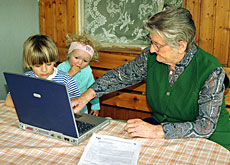
Elderly depend on family care

Family members provide more than two thirds of the care given to elderly people, according to a report from the Federal Coordination Commission on Family Issues.
The government body called for more political support for such carers, arguing that the current state of affairs had left family networks struggling.
The report’s authors said that current debate focuses on young families, and forgets the contribution of the older generation, which includes childcare, looking after older family members, as well as gifts and inheritances.
The commission warned that although public services such as meals on wheels and nurse visits exist for the elderly, it was not enough, and that carers needed more support.
It recommended looking into reimbursing carers either with a family allowance or tax breaks, practices already implemented in canton Fribourg.
Another option would be to discuss whether inheritance tax could be used to fund the costs of looking after the elderly.
However, this is unlikely to happen, especially after a recent vote in the House of Representatives went against introducing such a measure.
The report also suggested encouraging young pensioners to volunteer more of their time.
The study highlighted that in 2004 a quarter of over-50-year-olds and a third of those aged between 65 and 79 gave over 160 million hours of their time, much of it to care for grandchildren. Women bore most of the burden.
Widening gap
The authors said that families were finding it increasingly difficult to juggle the demands of a profession with their private life.
This was a reason why the number of people choosing not to have children was on the rise.
The authors added that children should not be viewed as personal luxuries, as the example of the Scandinavian countries and France proved that progressive policies in family and equal opportunities led to more couples having offspring.
swissinfo with agencies
The Federal Coordination Commission on Family Issues was set up in 1995 to advise the interior ministry.
It strives to make the reality of family life known to institutions and the public and to identify areas where more research is needed.
Its members come from science, research and family-orientated organisations.

In compliance with the JTI standards
More: SWI swissinfo.ch certified by the Journalism Trust Initiative




























You can find an overview of ongoing debates with our journalists here . Please join us!
If you want to start a conversation about a topic raised in this article or want to report factual errors, email us at english@swissinfo.ch.